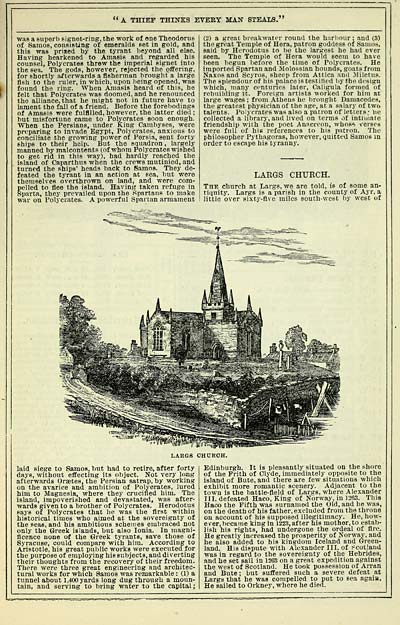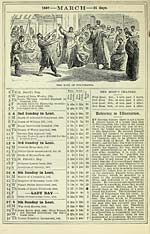Download files
Complete book:
Individual page:
Thumbnail gallery: Grid view | List view

A THIEF THINKS EVERY MAN STEALS.
was a superb signet-ring, the work of one Theodoras
of Saiuos, consisting of emeralds set in gold, and
this was prised by the tyrant beyond all else.
Having hearkened to Amasis and regarded his
counsel, Polycrates threw the imperial signet into
the sea. The gods, however, rejected the offering,
for shortly afterwards a fisherman brought a large
fish to the ruler, in which, upon being opened, was
found the ring. When Amasis heard of this, he
felt that Polycrates was doomed, and he renounced
the alliance, that he might not in future have to
lament the fall of a friend. Before the forebodings
of Amasis were fulfilled, however, the latter died ;
but misfortune came to Polycrates soon enough.
When the Persians, under King Cambyses, were
preparing to invade Egypt, Polycrates, anxious to
conciliate the growing power of Persia, sent forty
6hips to their help. But the squadron , largely
manned by malcontents (of whom Polycrates wished
to get rid in this way), had hardly reached the
island of Oaparthus when the crews mutinied, and
turned the ships' heads back to Samos. They de-
feated the tyrant in an action at sea, but were
themselves overthrown on land, and were com-
pelled to flee the island. Having taken refuge in
Sparta, they prevailed upon the Spartans to make
war on Polycrates. A powerful Spartan armament
(2) a great breakwater round the harbour; and (3)
the great Temple of Hera, patron goddess of Samos,
said by Herodotus to be the largest he had ever
6een. The Temple of Hera would seem to have
been begun before the time of Polycrates. He
imported Spartan and Molo^sian hounds, goats from
Naxos and Scyros, sheep from Attica and Miletus.
The splendour of his palace is testified by the design
which, many centuries later, Caligula formed of
rebuilding it. Foreign artists worked for him at
large wages ; from Athens he brought Damacedes,
the greatest physician of the age, at a salary of two
talents. Polycrates was also a patron of letters; he
collected a library, and lived on terms of intimate
friendship with the poet Anacreon, whosi verses
were full of his references to his patron. The
philosopher Pythagoras, however, quitted Samos in
order to escape his tyranny.
LARGS CHURCH.
The church at Largs, we are told, is of some an-
tiquity. Largs is a parish in the county of Ayr, a
little over sixty-five miles south-west by west of
LARG8 OHtJEOH.
laid siege to Samos, but had to retire, after forty
days, without effecting its object. Not very long
afterwards Oraetes, the Persian satrap, by working
on the avarice and ambition of Polycrates, lured
him to Magnesia, where they crucified him. The
island, impoverished and devastated, was after-
wards given to a brother of Polycrates. Herodotus
says of Polycrates that he was the first within
historical times who aimed at the sovereignty of
the seas, and his ambitious schemes embraced not
only the Greek islands, but also Ionia. In magni-
ficence none of the Greek tyrants, save those of
Syracuse, could compare with him. According to
Aristotle, his great public works were executed for
the purpose of employing his subjects, and diverting
their thoughts from the recovery of their freedom.
There were three great engineering and architec-
tural works for which Samos was remarkable : (1) a
tunnel about 1,400 yards long dug through a moun-
tain, and serving to bring water to the capital ;
Edinburgh. It is pleasantly situated on the shore
of the Frith of Clyde, immediately opposite to the
island of Bute, and there are few situations which
exhibit more romantic scenery- Adjacent to the
town is the battle-field of Largs, where Alexander
III. defeated Haco, King of Norway, in 1263. This
Haco the Fifth was surnamed the Old, and he was,
on the death of his father, excluded from the throne
on aocount of his supposed illegitimacy. He, how-
ever, became king in 1223, after his mother, to estab-
lish his rights, had undergone the ordeal of fire.
He greatly increased the prosperity of Norway, and
he also added to his kingdom Iceland and Green-
land. His dispute with Alexander III. of Scotland
was in regard to the sovereignty of the Hebrides,
and he set sail in 1263 on a great expedition against
the west of Scotland. He took possession of Arran
and Bute; but suffered such a severe defeat at
Largs that he was compelled to put to sea agaia.
He sailed to Orkney, where he died.
was a superb signet-ring, the work of one Theodoras
of Saiuos, consisting of emeralds set in gold, and
this was prised by the tyrant beyond all else.
Having hearkened to Amasis and regarded his
counsel, Polycrates threw the imperial signet into
the sea. The gods, however, rejected the offering,
for shortly afterwards a fisherman brought a large
fish to the ruler, in which, upon being opened, was
found the ring. When Amasis heard of this, he
felt that Polycrates was doomed, and he renounced
the alliance, that he might not in future have to
lament the fall of a friend. Before the forebodings
of Amasis were fulfilled, however, the latter died ;
but misfortune came to Polycrates soon enough.
When the Persians, under King Cambyses, were
preparing to invade Egypt, Polycrates, anxious to
conciliate the growing power of Persia, sent forty
6hips to their help. But the squadron , largely
manned by malcontents (of whom Polycrates wished
to get rid in this way), had hardly reached the
island of Oaparthus when the crews mutinied, and
turned the ships' heads back to Samos. They de-
feated the tyrant in an action at sea, but were
themselves overthrown on land, and were com-
pelled to flee the island. Having taken refuge in
Sparta, they prevailed upon the Spartans to make
war on Polycrates. A powerful Spartan armament
(2) a great breakwater round the harbour; and (3)
the great Temple of Hera, patron goddess of Samos,
said by Herodotus to be the largest he had ever
6een. The Temple of Hera would seem to have
been begun before the time of Polycrates. He
imported Spartan and Molo^sian hounds, goats from
Naxos and Scyros, sheep from Attica and Miletus.
The splendour of his palace is testified by the design
which, many centuries later, Caligula formed of
rebuilding it. Foreign artists worked for him at
large wages ; from Athens he brought Damacedes,
the greatest physician of the age, at a salary of two
talents. Polycrates was also a patron of letters; he
collected a library, and lived on terms of intimate
friendship with the poet Anacreon, whosi verses
were full of his references to his patron. The
philosopher Pythagoras, however, quitted Samos in
order to escape his tyranny.
LARGS CHURCH.
The church at Largs, we are told, is of some an-
tiquity. Largs is a parish in the county of Ayr, a
little over sixty-five miles south-west by west of
LARG8 OHtJEOH.
laid siege to Samos, but had to retire, after forty
days, without effecting its object. Not very long
afterwards Oraetes, the Persian satrap, by working
on the avarice and ambition of Polycrates, lured
him to Magnesia, where they crucified him. The
island, impoverished and devastated, was after-
wards given to a brother of Polycrates. Herodotus
says of Polycrates that he was the first within
historical times who aimed at the sovereignty of
the seas, and his ambitious schemes embraced not
only the Greek islands, but also Ionia. In magni-
ficence none of the Greek tyrants, save those of
Syracuse, could compare with him. According to
Aristotle, his great public works were executed for
the purpose of employing his subjects, and diverting
their thoughts from the recovery of their freedom.
There were three great engineering and architec-
tural works for which Samos was remarkable : (1) a
tunnel about 1,400 yards long dug through a moun-
tain, and serving to bring water to the capital ;
Edinburgh. It is pleasantly situated on the shore
of the Frith of Clyde, immediately opposite to the
island of Bute, and there are few situations which
exhibit more romantic scenery- Adjacent to the
town is the battle-field of Largs, where Alexander
III. defeated Haco, King of Norway, in 1263. This
Haco the Fifth was surnamed the Old, and he was,
on the death of his father, excluded from the throne
on aocount of his supposed illegitimacy. He, how-
ever, became king in 1223, after his mother, to estab-
lish his rights, had undergone the ordeal of fire.
He greatly increased the prosperity of Norway, and
he also added to his kingdom Iceland and Green-
land. His dispute with Alexander III. of Scotland
was in regard to the sovereignty of the Hebrides,
and he set sail in 1263 on a great expedition against
the west of Scotland. He took possession of Arran
and Bute; but suffered such a severe defeat at
Largs that he was compelled to put to sea agaia.
He sailed to Orkney, where he died.
Set display mode to: Large image | Transcription
Images and transcriptions on this page, including medium image downloads, may be used under the Creative Commons Attribution 4.0 International Licence unless otherwise stated. ![]()
| Scottish Post Office Directories > Towns > Forfar > Forfar directory and year book > 1887 > (95) |
|---|
| Permanent URL | https://digital.nls.uk/85364165 |
|---|
| Description | Forfar : W. Shepherd, 1884- |
|---|---|
| Description | Directories of individual Scottish towns and their suburbs. |
|---|
| Description | Around 700 Scottish directories published annually by the Post Office or private publishers between 1773 and 1911. Most of Scotland covered, with a focus on Edinburgh, Glasgow, Dundee and Aberdeen. Most volumes include a general directory (A-Z by surname), street directory (A-Z by street) and trade directory (A-Z by trade). |
|---|


